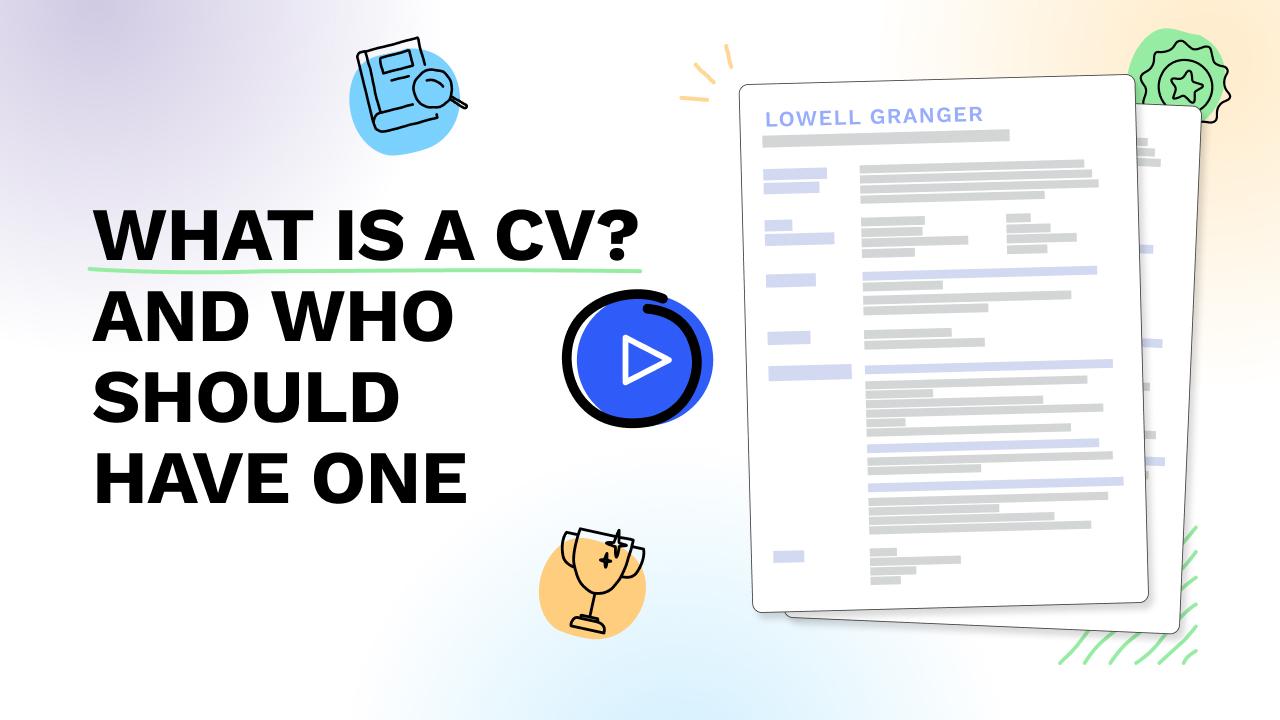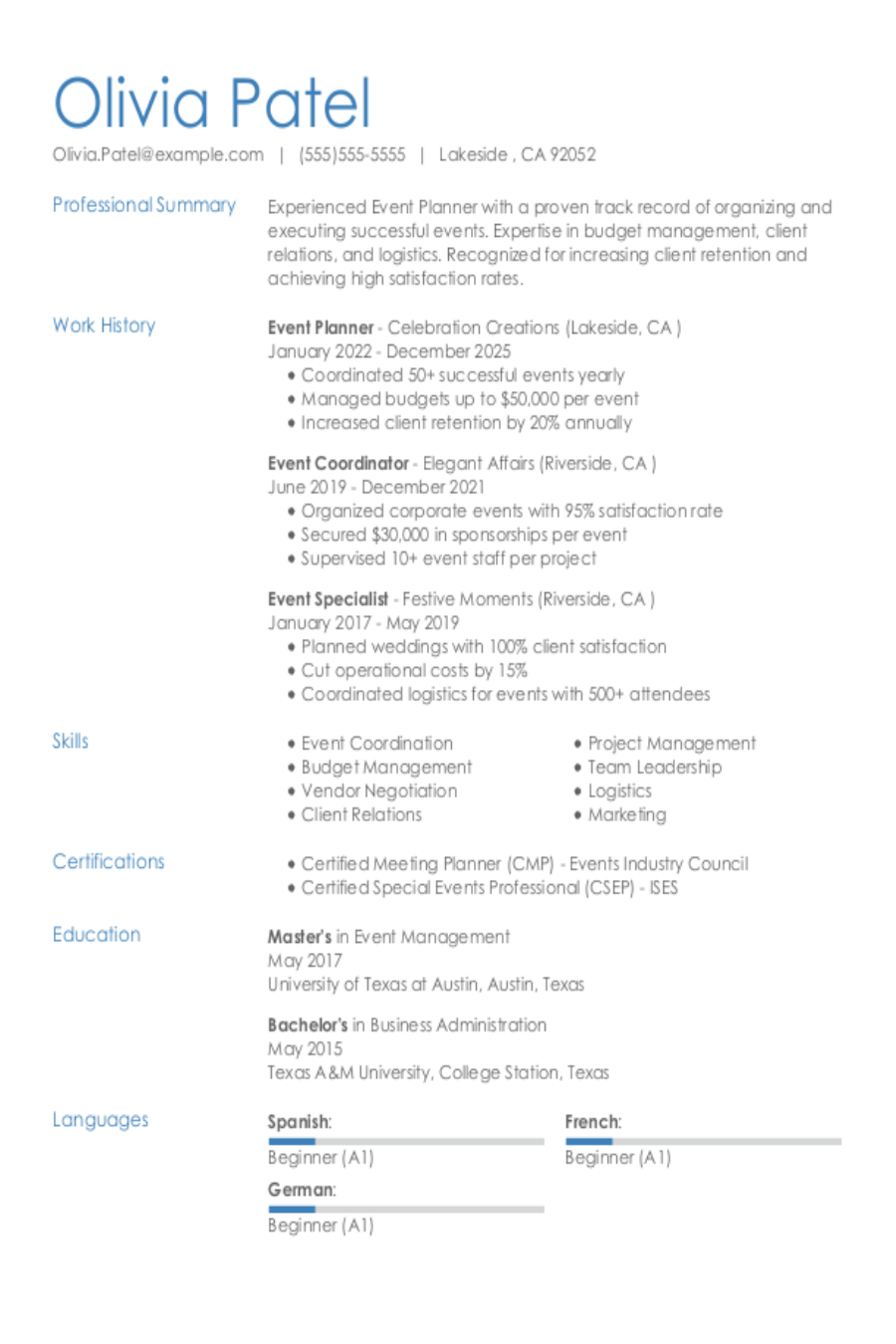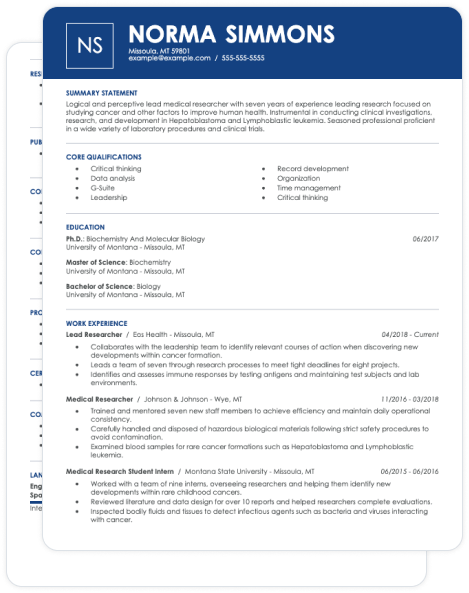Curious about what a CV is and how it differs from a resume? We'll help answer these questions so you can decide whether making a CV is the next move for your career.
You may have heard that the meaning of CV is different in the U.S. and in Europe. That's a common source of confusion. We'll break down the uses of both kinds of CVs and the differences between them, and walk you through how to build a strong one.
This guide will show you:
- The definition of a CV in Europe and the U.S.
- Why the meaning of CV changes depending on your location
- How a CV for a regular job differs from an academic CV

Do you need to make a CV? If so, head directly to our AI CV Maker, where you can choose a template and get hundreds of text examples for each section of your CV.
What Is a CV?
CVs, an abbreviation for the Latin term curriculum vitae, are a type of detailed job application document used in academia and certain career fields in the U.S.
But just what is a CV? To answer your question, we first need to know: Where do you live?
What is an American CV?
In the U.S., Australia, and Canada, a CV is a longer, more detailed document than a typical resume. CVs are used by job seekers in academic fields like medicine, academia, law, and science.
CVs include the typical work experience and skills of a resume, along with academic achievements, awards, scholarships, and research projects. They are an important part of the job search for the millions of professionals who work in law, medicine, and higher education.
Not sure if your field requires a CV or a resume? Pay attention to the language used in the job description. If you're still unsure which document to use, check in with a mentor or colleague in your field.
What does CV mean in Europe?
Throughout the rest of the world, including Europe, CVs are almost indistinguishable from American resumes. They are one- to two-page application documents used by job seekers in all career fields.
Other than some minor differences—such as it being more common for European CVs to include personal information you wouldn't find on a resume, like hobbies and nationality—they are essentially the same. The actual difference between a resume and a typical CV in Europe mostly comes down to their name.
What Is a CV for a Job?
Before we move on, remember: If you're in the U.S. and you're working in a typical professional role, you should create a resume, not a CV. Making a resume is similar to writing a CV, but you'll need to adhere to different standards.
Now, let's look at how to write a CV for a European job application. If you're making a CV for a job in Europe, follow these steps:
- Create a neat CV header. Include your name, phone number, email address, city and country, and any relevant links, like your portfolio or LinkedIn profile.
- Write a concise resume profile. Briefly describe your career highlights using a professional summary to describe your expertise or a resume objective to highlight your potential.
- List your previous jobs in the work experience section. Use specific metrics and accomplishments to strengthen the impact of your work history.
- Include a well-rounded selection of skills. Make sure you add keywords from the job description for the role you're targeting to pass through ATS screenings.
- Include your credentials. Cover your educational achievements and professional certifications in the education section.
- Consider adding optional sections. Sections like foreign languages, projects, volunteer work, and awards can set you apart from other similarly qualified candidates.
- Review and download your CV. Review your document for any typos or errors you need to iron out. Then, download your CV as a PDF.
No matter what kind of CV you write, a neat template is a must. Your CV template should be ATS-friendly and clearly organized, with consistent formatting throughout. Check out our library of CV templates to find one that fits your needs.
What Is an Academic CV?
An academic CV is longer and more detailed than a resume or an international CV. An academic CV presents your complete educational and professional background. You'll include everything that goes into a resume and add other relevant sections that show the depth of your expertise.
An academic CV should include the following typical resume sections:
- Contact information: Just like a resume, your CV's header should feature your name, email address, phone number, city and state, and any other relevant details.
- Summary statement: Start with a tight, informative summary statement explaining why you are the best candidate for the job.
- Core qualifications: Highlight your most relevant qualifications as a bullet-point list near the top of the CV. Include a mix of hard and soft skills.
- Education: Education plays a more central role in the CV, with most candidates having an advanced degree.
- Teaching experience: Academic candidates should always place teaching experience on the first page.
These optional sections are also frequently found on academic CVs:
- Research experience: Showcase research projects you've been involved with by listing your experience in the field or the classroom.
- Publications: Include any papers you've published in a professional forum, like an academic journal.
- Awards and honors: Mention the scholarships, grants, and other honors and awards you've received for work in your chosen career field.
- Presentations and lectures: Touch on presentations or lectures you've delivered, either at a professional conference, seminar, or other high-profile setting.
- Professional associations: Most CV writers belong to at least one association. Here's your chance to show your professional engagement.
Check out our library of CV examples to see how professionals in your industry structure their job-winning CVs.
What Is the Difference Between a CV and a Resume?
CVs and resumes may have the same goal—helping you land a job—but the execution is significantly different.
Here are three fundamental differences between the two:
CVs are used in fewer career fields
Unlike resumes, which are popular in most industries, CVs have a narrow application. In the U.S., they are used mainly for academic purposes, such as applying for a graduate program or faculty position, and in fields like medicine, law, and the sciences.
CVs are longer
Resumes are one to two pages long and focused on recent experience. CVs are often longer and can take up five or six pages—as many pages as needed to detail a candidate's professional and academic history.
CVs have more sections
While resumes usually focus on five core sections—contact information, professional summary, work experience, skills, and education—a well-written CV will include those and additional sections like research projects, professional associations, publications, and awards.
Final Thoughts
The fact that CVs have different meanings around the world can be confusing for many. The good news is that, no matter whether you're writing a one-page resume or a six-page academic CV, all you need to show employers that you have the qualifications they're looking for is a neat template, targeted content, and a clear strategy.
Worried about whether your CV will pass through ATS screening? Try our free ATS Resume Checker, which works just as well to screen CVs, to receive your score and improve your document's chances.
Key Takeaways
In Europe, a CV and a resume are basically the same.
CVs are the same as resumes throughout much of the world and should include the basic resume sections.
In the U.S., CVs are written for academic fields.
You'll make a CV for academic careers like medicine and law when you're based in the U.S., Australia, or Canada.
Academic CVs are longer than European CVs.
If you're writing an academic CV, you should cover your entire teaching and research history. This makes them often run longer than two pages.
CVs should always be customized.
Whether you're writing a CV in or outside the U.S., you should personalize your application for every job you're targeting.
Don is a Certified Professional Resume Writer (CPRW) with more than 10 years' experience creating digital content, including four years helping job seekers develop their careers. He holds an M.S. in Journalism from Northwestern University.
More resources

Summary of Qualifications: 13 Examples for Your Resume
Our guide will help you write a summary of qualifications that...

How to Write a Cover Letter in 2025
A great cover letter will impress employers and get you hired....

Cost of Living Crunch: 92% of Americans Cut Back Spending in 2025
Resume Now s survey reveals a cost of living crisis that has l...

Event Planning Resume: Examples & Templates
As an event planner you need a resume that highlights your cr...

Chemical Engineering Resume: Examples & Templates
As a chemical engineer you need a resume that showcases your ...

Biology Resume: Examples & Templates
As a biologist you need a standout resume that captures the a...

